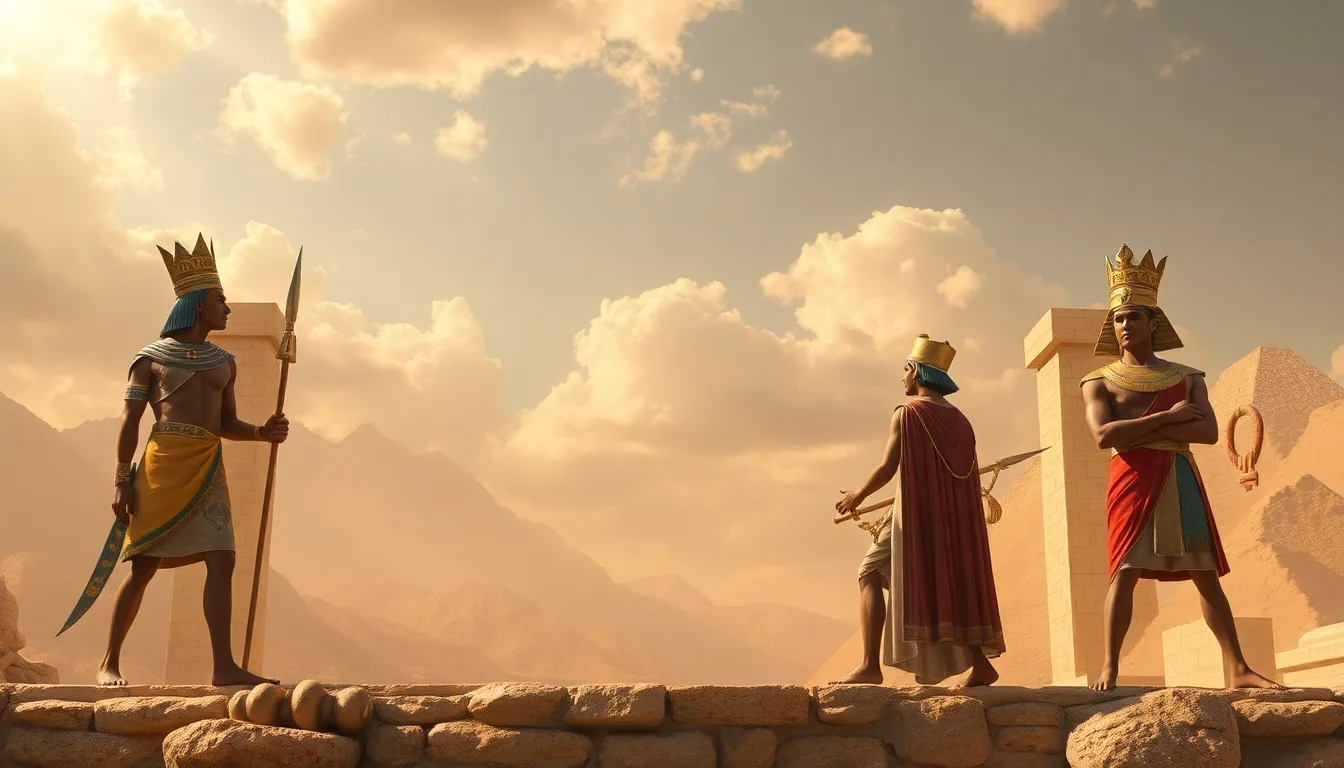The Role of Divine Kingship in Egyptian Mythological Texts
I. Introduction
Divine kingship in ancient Egypt refers to the belief that the pharaoh was not merely a political leader but also a divine figure, embodying the gods on earth. This concept merged the realms of politics, religion, and society, establishing the pharaoh as a central figure in both governance and spiritual life. The importance of divine kingship in Egyptian mythology is profound, as it provided a framework through which the ancient Egyptians understood their rulers and their place in the universe. The purpose of this article is to explore the various dimensions of divine kingship as depicted in Egyptian mythological texts, examining its historical roots, mythological foundations, and its influence on ancient Egyptian society.
II. Historical Context of Divine Kingship
The origins of divine kingship in ancient Egyptian civilization can be traced back to the early dynastic period, where the unification of Upper and Lower Egypt under a single ruler marked the emergence of a centralized power. The concept evolved with key historical figures such as Narmer, the first pharaoh of unified Egypt, and later dynasties like the Old Kingdom, where the notion of the divine right to rule became firmly established.
- Key Historical Figures:
- Narmer: Unifier of Egypt and the first pharaoh.
- Djoser: Commissioned the Step Pyramid, symbolizing divine kingship.
- Khufu: Builder of the Great Pyramid, reinforcing the divine status of the pharaoh.
The concept of divine kingship evolved over different periods, adapting to changes in religious beliefs, political structures, and societal needs. By the New Kingdom, the idea of the pharaoh as a god became more pronounced, with rulers like Ramses II and Akhenaten redefining the relationship between gods and kingship.
III. Mythological Foundations of Divine Kingship
Major Egyptian deities related to kingship include Horus, Osiris, and Ra. Each of these gods played a crucial role in legitimizing the pharaoh’s rule through various myths and narratives.
- Horus: Represented kingship and the protector of the pharaoh, often depicted as a falcon.
- Osiris: Symbolized resurrection and the afterlife, connecting the pharaoh to the divine cycle of rebirth.
- Ra: The sun god, associated with creation, who was believed to be the source of the pharaoh’s power.
Myths such as the “Contendings of Horus and Seth” illustrate the divine nature of pharaohs, depicting the ongoing struggle for power that reflects the balance between order and chaos in the universe. The symbolism of kingship in these narratives underscores the belief that the pharaoh was chosen by the gods to maintain Ma’at, or cosmic order.
IV. The Pharaoh as a Divine Mediator
The pharaoh served as a critical link between the gods and the people, a divine mediator whose role was to ensure that the will of the gods was enacted on earth. This was reinforced through various rituals and ceremonies, such as the Sed festival, which celebrated the pharaoh’s reign and reaffirmed his divine status.
Rituals like the coronation ceremony involved sacred acts that connected the new king with Horus, establishing his legitimacy. The “Opening of the Mouth” ceremony was another important ritual that symbolized the pharaoh’s role in providing sustenance to the gods and ensuring their favor.
Examples of divine mediation can be found in texts like the Pyramid Texts and the Coffin Texts, which detail the pharaoh’s journey after death and highlight his continued role as a divine being in the afterlife.
V. Divine Kingship in Political and Social Structures
Divine kingship significantly influenced governance and law in ancient Egypt. The pharaoh was seen as the ultimate authority, his decrees considered the embodiment of divine will. This belief system helped to legitimize power and authority, as the pharaoh’s decisions were viewed as aligned with the interests of the gods.
The social implications of perceiving the pharaoh as a god were profound. It created a hierarchal society where the king was at the top, followed by nobles, priests, and commoners. This hierarchy was essential for maintaining order and stability in a society that relied heavily on agricultural and economic productivity.
VI. Artistic Representations of Divine Kingship
Art played a crucial role in representing and reinforcing the concept of divine kingship. Iconography and symbols associated with divine kingship included:
- The ankh, symbolizing life.
- The crook and flail, representing kingship and authority.
- The Pharaoh’s headdresses, such as the nemes and the double crown of Upper and Lower Egypt.
Analysis of temple reliefs, statues, and artifacts reveals how artists depicted pharaohs in divine forms, often in the company of gods. These artistic expressions not only served religious purposes but also influenced public perception of the pharaoh’s divinity, solidifying their status in the eyes of the people.
VII. The Decline of Divine Kingship
Several factors contributed to the decline of divine kingship in later periods of ancient Egyptian history. Shifts in religious beliefs, such as the rise of monotheism during the reign of Akhenaten, challenged traditional views of the pharaoh’s divine status. Additionally, the increasing power of local governors and the priesthood began to undermine the central authority of the pharaoh.
As new forms of governance emerged, including foreign rule and the eventual establishment of a more democratic system in some regions, the concept of divine kingship became less relevant. The comparison of divine kingship with these emerging forms of governance illustrates a significant transition in how power and authority were perceived.
VIII. Conclusion
In summary, divine kingship was a foundational aspect of ancient Egyptian culture, intertwining mythology, governance, and social structure. The lasting legacy of this concept can be seen in the way it shaped not only political systems but also religious beliefs and artistic expressions throughout Egyptian history. Understanding divine kingship provides valuable insights into ancient political and religious systems, highlighting the complexities of power, divinity, and governance in one of history’s most fascinating civilizations.




